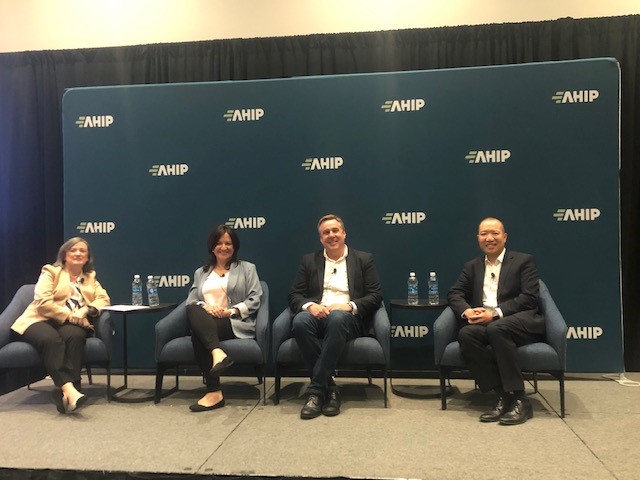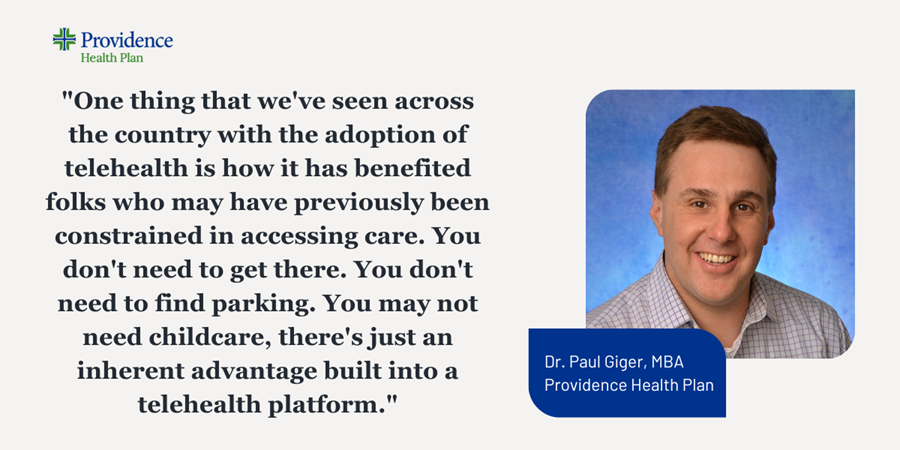Innovation & Insights
The Behavioral Health Concierge: A People-First Innovation in Behavioral Health
25 August 2023
The Behavioral Health Concierge: A People-First Innovation in Behavioral Health
PHP’s Medical Director of Behavioral Health, Dr. Paul Giger, discusses how PHP is addressing mental health care at the 2023 AHIP conference
With more than 44 million adults in the U.S. living with a mental health condition, and the rate of youth with mental health struggles continuing to rise, Americans need emotional support and access to quality, affordable behavioral healthcare now more than ever.
Recent studies have revealed where the healthcare industry can help, such as findings from the NORC Research Institute at the University of Chicago. The research found 57% of patients who wanted mental health or substance use care struggled to receive it, and the gap was even higher for youth and adolescents, with 69% of parents reporting trouble finding care for their children. This need is one of the driving forces behind our work at Providence Health Plan (PHP) to continue providing members with impactful resources like the Behavioral Health Concierge.
At this year’s America’s Health Insurance Plans (AHIP) conference, PHP’s Medical Director of Behavioral Health, Dr. Paul Giger, joined Cathlyn Fraguela Rios and Patrick Lee of Providence and Dr. Deborah Fernandez-Turner, Deputy Chief Psychiatric Officer at Aetna, to reflect on how PHP worked with the Providence system to develop the first-of-its-kind Behavioral Health Concierge. Born as a resource to support the mental health needs of PHP staff and frontline Caregivers, the platform was so popular it has been expanded to serve members of PHP’s group insurance plans.
Read on to learn about the Behavioral Health Concierge and how we can work together to support the mental well-being of our communities.

The Creation of the Behavioral Health Concierge
Dr. Giger and his colleagues shared the origin story of the Behavioral Health Concierge, a resource for timely mental healthcare offered by PHP which first began as an offering to support Providence Health System’s providers. Even before the pandemic, PHP recognized a growing need for mental wellness support for the organization’s physicians and staff, called Caregivers.
“Anybody that does patient care, they really have mental health needs just like the rest of us,” Cathlyn Fraguela Rios said. “The whole point of it was to create a digital telehealth program because we know our Caregivers work different hours, and it's really hard for them to get in ― and this was before the pandemic made telehealth accessible to everybody…2019 is when we started seeing our own Caregivers, and then it expanded into Washington, Oregon, and everywhere Providence has a footprint.”
The Behavioral Health Concierge offers convenient benefits for members and their families coping with life stressors, mental health, and addiction issues, including a platform to easily schedule appointments for video and in-person behavioral health visits with a dedicated network of high-quality providers. Beyond counseling and care guidance, members can make use of self-help tools and digital programs like one for Cognitive Behavioral Therapy (CBT), which helps people problem-solve by understanding the connection between their thoughts, feelings, and behaviors.
Tangible Outcomes
The Behavioral Health Concierge has made a proven impact on the mental health of Caregivers and members. With about 40,000 completed visits for over 7,000 patients since 2019, patients have seen an average decrease in symptoms of depression by 53% and severe anxiety by 54% between their first and last visits. A difference has also been felt in easy access to care: recent data showed 60% of members saw a provider within seven days, which is higher than the community standard.
“The model of care was intentionally designed to promote access ― not only is it evidence-based and has a lot of great validation that it's effective, it's also basically designed to ensure that access is built into the model. I think it's also a key element,” Dr. Giger said. “The fact that it has a massive amount of research showing that it's effective is also a major bonus.”
Lessons Learned + Looking to the Future
As we continue to focus on resources like the Behavioral Health Concierge, it’s important to look for ways to improve and refine approaches to mental health care. Dr. Giger and his fellow panel participants shared key learnings from the implementation of the Behavioral Health Concierge, including:
-
It’s critical to continue assessing the impact of virtual programs and how therapies like CBT can make a difference in areas like preventive care for chronic conditions.
-
Utilization of virtual programs sometimes starts slow as patients don’t know about them. It’s imperative to get the word out about these types of services and build awareness of them.
-
Telehealth is not the solution for everybody, but it's a good solution for a lot of people.

Mental health is vital to overall well-being, with proven links between behavioral and physical health, and everyone deserves access to compassionate, personalized, and timely treatment. People-first innovations like the Behavioral Health Concierge are an important part in serving the needs of members and our communities, contributing to addressing the mental health crisis, and advancing Health For All. You can learn more about the Behavioral Health Concierge in a recent piece from the Portland Business Journal and check out a recap of AHIP in our recent blog to learn more.





